Satantango Blu-ray Movie
HomeSatantango Blu-ray Movie 
SátántangóArbelos | 1994 | 440 min | Not rated | Jan 12, 2021
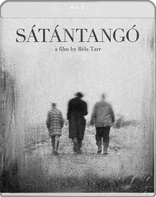
Movie rating
8.4 | / 10 |
Blu-ray rating
| Users | 0.0 | |
| Reviewer | 4.5 | |
| Overall | 4.5 |
Overview
Satantango (1994)
Plotting on a payment they are about to receive, residents of a collapsing collective farm see their plans turn into desolation when they discover that Irimiás, a former co-worker who they thought was dead, is coming back to the village.
Starring: János Derzsi, Erika Bók, Mihály Kormos, Mihály VigDirector: Béla Tarr
| Foreign | 100% |
| Drama | 80% |
Specifications
Video
Video codec: MPEG-4 AVC
Video resolution: 1080p
Aspect ratio: 1.66:1
Original aspect ratio: 1.66:1
Audio
Hungarian: DTS-HD Master Audio Mono
Subtitles
English
Discs
Blu-ray Disc
Two-disc set (2 BDs)
Packaging
Slipcover in original pressing
Playback
Region A (locked)
Review
Rating summary
| Movie | 4.5 | |
| Video | 4.5 | |
| Audio | 4.0 | |
| Extras | 3.0 | |
| Overall | 4.5 |
Satantango Blu-ray Movie Review
Reviewed by Jeffrey Kauffman January 9, 2021Hollywood may understandably consider itself the “leader” of the global film industry, but in at least one category it has significant room for "improvement", though "improvement" may not exactly be the correct term for more antsy types, as will be disclosed. Running times for movies coming out of La-La Land or frankly most other major film capitals have tended to be between an hour and a half and two hours, at least roughly speaking, part of which is due to the fact that exhibitors wanted a “product” they could show several times daily, hopefully at easily discernable times, in a kind of presaging of the way broadcast and later much of cable television would opt for 30, 60, 90 or 120 minute episode lengths. Occasionally “fearless” (or, frankly, stupid) filmmakers have stepped outside of this self imposed restriction, and there are some insanely long narrative films that have appeared through the years, including Heaven's Gate (our database lists 217 minutes for the Blu-ray, but a number of online sites list 5 hours and 25 minutes as at least one of its theatrical running times); Cleopatra (Blu-ray: 251 minutes, online lists of theatrical running time: 5 hours, 20 minutes); Hamlet (242 minutes); and Gone with the Wind (238 minutes). Even some of the five hour plus running times mentioned above can be dwarfed by various other films that have appeared through the years, in narrative, documentary and experimental formats. A 2012 Swedish film called Logistics kind of plies a middle ground between documentary and experimentation in a recounting (literally and figuratively) of the manufacture and sale of a pedometer (albeit in "reverse" order, starting with the sale and then working backwards), which clocks in at an astounding 51,420 minutes (that's over 35 days for those keeping track). Claude Lanzmann's harrowing 1985 Holocaust documentary Shoah lasts 568 minutes, and was famously screened over the course of two days for many who saw it theatrically. Into this temporal fray steps Sátántangó, a 1994 Hungarian film from Béla Tarr which runs for well over seven hours and which presents such a monolithic edifice to absorb and hopefully understand that there are a number of online articles offering detailed analyses that can almost seem like advice about how to go about watching the film. (The article I've linked to is by the same people credited with an essay supposedly included with this release, though my review copy came without an insert booklet, which is where I'm assuming it is, since there's no PDF material on either of the Blu-ray discs.)
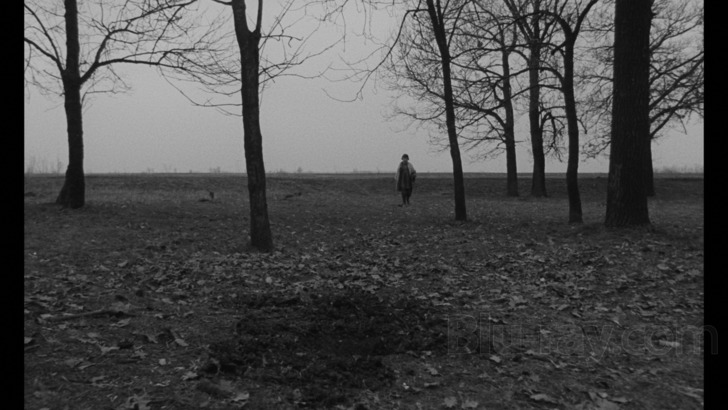
Sátántangó was culled from a novel by László Krasznahorkai, who had previously collaborated with Tarr on Damnation, and it may be salient to note some of Krasznahorkai's stylistic and structural conceits, which are at least somewhat mirrored in the film adaptation. Both the novel (which I admittedly have not read, and so am basing comments on what I've been able to glean from online research) and the film are built out of sections of six, mimicking the choreographic underpinning of the tango (as alluded to in the film's title), with a total of twelve "sections", which in the film are given their own interstitial "chapter headings". The film is split on the Blu-ray discs into three "parts" (see screenshot 20 for a look at the main menu of Disc One of this release, which has Parts I and II). However, Parts I and II offer three sections each, and Part III is comprised of six, for a grand total of twelve. That said, neither the novel nor the film present things strictly chronologically, and in fact the film at least at times gives in to what might be called a Rashomon-esque approach whereby the same events are seen from different perspectives. As Kevin B. Lee gets into in his visual essay accompanying the film as a supplement, the fact that Tarr doesn't always hew to the same timings and/or dialogue or even actions in some of these "revisitings" gives the film a kind of weirdly random feeling where "objectivity" can never be determined.
Despite a ping ponging stylistic approach that can see various scenes play out in virtual stasis, with nary a movement to be discerned (except by the eagle eyed), while others involve frequent lateral tracking shots (as Lee gets into in his interesting essay), a story does unfold, albeit so discursively that it's really more in terms of individual vignettes than overall narrative thrust that the film may attain its most powerful moments. There's a "pretzel" or infinity loop aspect to the structure, perhaps mirroring the back and forth of the tango itself, but the underlying premise here suggests the collapse of a collectivist community, with a number of lives thrown into chaos as a result. The fact that this is a Hungarian film might instantly suggest some kind of critique of Communism or similar collectivist ideologies, but the film is "political" probably only in the sense that it doesn't shirk from detailing a certain charlatanism in ostensible "leaders". The stylistic conceit also includes the fact that large swaths of the film play out in unedited takes, and in fact Lee in his on disc essay does some of the "math" involved, in terms of the film's overweening length vs. the relatively small number of cuts it employs.
There are a handful of characters whose stories interlock, with the most emotionally harrowing moments probably given over to a little girl named Estike (Erika Bók). (More won't be said in this regard, other than that Estike's storyline is shocking on more than one level.) Characters are caught in almost Groundhog Day cycles of repetition, with a hoped for "escape" just leading to more drama. Principal characters include Irimiás (Mihály Víg, also the film's composer), who might be thought of as the cult leader; Mrs. Schmidt (Éva Almássy Albert), stuck in an unhappy marriage; and the Doctor (Peter Berling), who can almost be seen as a stand in of sorts for the audience, as he's an observer of various events that unfold. There's an almost post-Apocalyptic ambience to this film, albeit within a kind of rustic rural ambience emphasizing village life. At one point things get positively Kafkaesque with a team of bureaucrats dealing with supposed "information" they've been given about the collective by Irimiás.
Satantango Blu-ray Movie, Video Quality 
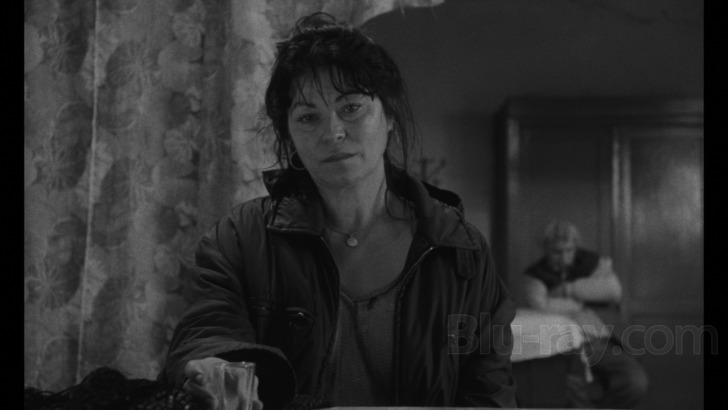
Sátántangó is presented on Blu-ray courtesy of Arbelos with an AVC encoded 1080p transfer in 1.66:1. While my copy didn't come with an insert booklet which might provide more information, Arbelos' website discloses the following about this transfer:
Sátántangó has been restored in 4K from the original 35mm camera negative by Arbelos in collaboration with The Hungarian Filmlab.The mise-en-scčne for this often intentionally provocative film is really distinctive, as can perhaps be made out from some of the screenshots I've included with this review. Gábor Medvigy's gorgeous black and white cinematography can utilize deep focus or even what looks like split diopter moments, offering both incredible close-ups and staggering, if bleak, vistas of an often sodden and rainy countryside. Detail levels are often exceptional, especially in the most extreme close-ups, where some of the weathered faces of members of the collective have an almost topographical appearance. Textures on things like stone walls or even the muddy roads various characters walk on tend to look precise. There are fluctuations in clarity which may be more noticeable than usual simply because there are so few hard edits in the film and these variances tend to happen at some of those juncture points. There are some isolated moments, typically scenes shots against skies, where grain can look slightly on the "swarmy" side, and just a few passing snippets where compression might seem just a bit wobbly, as in the first of many shots through a lace curtain at around 21:15.
Satantango Blu-ray Movie, Audio Quality 
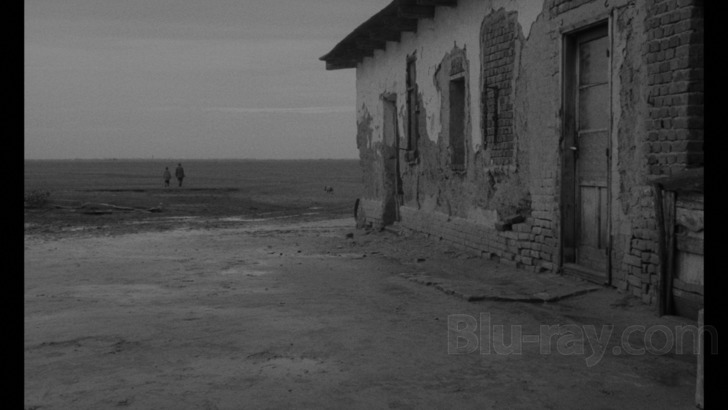
Sátántangó features a fine sounding DTS-HD Master Audio Mono track in the original Hungarian. The film is a study in both ambient environmental sounds as well as near silence a lot of times, as in the now famous opening sequence documenting a herd of cows wandering around various abandoned spaces. Dialogue sequences are presented cleanly and clearly, and Mihály Vig's score encounters no issues, either. Optional English subtitles are available.
Satantango Blu-ray Movie, Special Features and Extras 
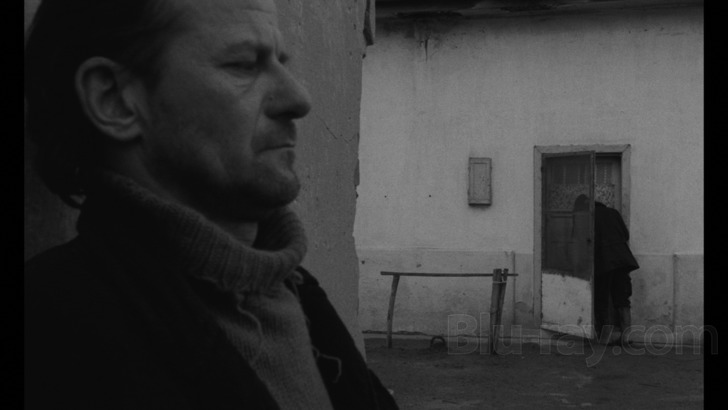
- A Sense of Rhythm (1080p; 41:17) is a new interview with composer and star Mihály Vig, who discusses some of the formative music of his youth among other biographical tidbits. In Hungarian with English subtitles.
- Orders of Time in Motion (1080p; 19:31) is a really interesting video essay by Kevin B. Lee which adroitly addresses the film's structural peculiarities, while also doing some fascinating side by side analyses of various moments that are ostensibly "repeated" from different points of view.
- 2007 Archival Interview with Director Béla Tarr (720p; 23:07) is moderated by Howard Feinstein and stems from a September 14, 2007 talk at the Walker Art Center. In English.
- U.S. Theatrical Trailer (1080p; 2:45)
Satantango Blu-ray Movie, Overall Score and Recommendation 
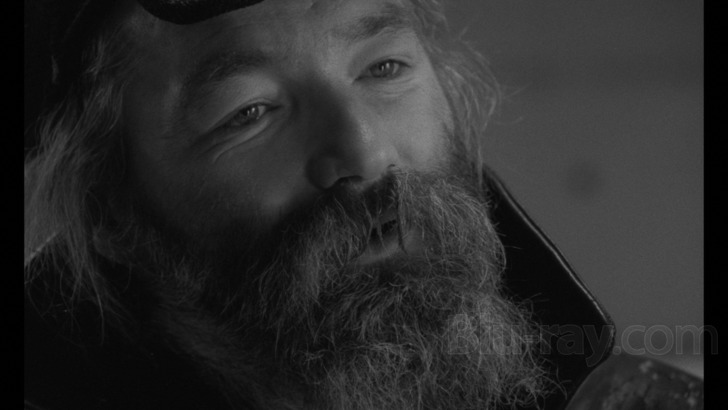
When a trailer features a pull quote from Susan Sontag, you can pretty much assume that the film has attained a perceived hipness quotient that few manage to. Some may frankly find Sátántangó's length ridiculous and inherently forbidding, but for those with nerves steeled and perhaps an above average amount of patience, Sátántangó is a surprisingly riveting, if also relentlessly depressing, viewing experience. Whether that ends up being in spite of or because of its running time will probably be a point of debate. Technical merits are solid, and the supplementary package well done. With caveats noted, Highly recommended.
Similar titles
Similar titles you might also like

The Turin Horse
A Torinói ló
2011

Damnation
Kárhozat
1988

The Sacrifice
Offret / Restored
1986

The Passion of Anna
En passion
1969

Nostalghia 4K
1983

Port of Call
Hamnstad
1948

The Color of Pomegranates
Նռան գույնը / Sayat Nova
1969

Aquarius
2016

Andrei Rublev
Андрей Рублёв / Andrey Rublev
1966

Mirror
Зеркало / Zerkalo
1975

Saraband
2003

Beau Travail
1999

Persona
1966

The Club
El Club
2015

Winter Light
Nattvardsgästerna
1963

The Silence
Tystnaden
1963

Through a Glass Darkly
Sĺsom i en spegel
1961

Heli
2013

Dekalog
The Decalogue
1988

Wild Strawberries
Smultronstället
1957
